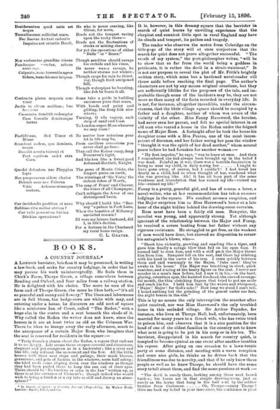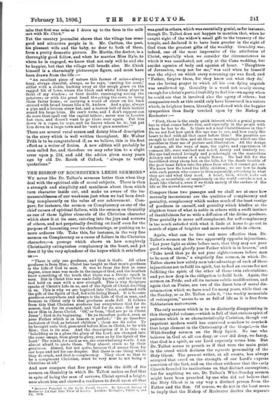BOOKS.
A COUNTRY JOURNAL.*
A LONDON barrister, briefless it may be presumed, is writing a law-book, and seeks for country lodgings, in order that he may pursue his work uninterruptedly. He finds them in Chick's Farm, Thorpe Green, a village somewhere between Reading and Oxford, and four miles from a railway-station. He is delighted with his choice. The more he sees of the farm and of Thorpe Green, the more he likes both,—" it's all so peaceful and sunny and flowery." The lilacs and laburnums are in full bloom, the hedge-rows are white with may, and entering under a house, he discovers an odd sort of square like a miniature Inn of Court, called " The Redan," with a huge elm in the centre and a seat beneath the shade of it. Why called the Redan the writer does not know, since the houses in it are at least twice as old as the Crimean War. There be likes to lounge away the early afternoon, much to the annoyance of a certain Major Ross, who imagines that the seat is reserved for residents in the square :— " Truly there's a charm about the Redan, a repose that endears it to me deeply. Life seems there creeper-covered and slumbrous, stagnant and yet evergreen as in a backwater ; like a river and like life, only without the movement and the flow. All the little houses with their neat steps and palings, their musk blooms, geraniums, and pots of fuchsia in the windows, seem half asleep ; the tiled roofs tome sloping down over the windows as though they had been pulled there to keep the sun out of their eyes. There should be No burdens or cries in the Inn" written up, as there is at the entrance of Clement's ; though indeed who would wish to Ming a burden or a cry into so still and drowsy an atmo- sphere?"
• In Search of Quiet : a Ct entry Joe-nat (May—J.11,y). By Walter Frith. London: Saab, El&r, and Co. It is, however, in this dreamy square that the barrister is search of quiet learns by unwilling experience that the sleepiest and sunniest little spot in rural England may have its clouds and tempest, its pathos and tragedy.
The reader who observes the motto from Coleridge on the title4page of the story will at once conjecture that the search for quiet does not prove altogether successful. " The result of my system," the poet-philosopher writes, "will be to show that so far from the world being a goddess in petticoats, it is rather the devil in a strait-waistcoat." Its is not our purpose to reveal the plot of Mr. Frith's brightly written story, which none but a hardened novel-reader will throw aside before reaching the final page. The author's characters are not by any means original creations, but they are sufficiently lifelike for the purposes of the tale, and im- probable though some of the incidents may be, they are not more so than many of the facts recorded in everyday life. It
is not, for instance, altogether incredible, under the circum- stances, that the little village square should be occupied by a father and a daughter, neither of whom was aware of the vicinity of the other. Miss Fanny Harewood, the heroine,
had never seen her parent, and felt no special interest in an old man who rented a house in the Redan under the feigned name of Major Ross. A fortnight after he took the house his daughter came with a Mrs. Pearce, one of the most incom- petent of duennas, and her father seeing her pass the window " thought it was the spirit of her dead mother," whom several years before he had forsaken for another woman :— " My first impulse," he says, " was to leave at once. And then I remembered she had always been brought up in the belief I was dead. Painful as it was, there was a terrible fascination in
being so near my child, in daily seeing her I ought to have gone away, of course, but I couldn't ! I had loved hes dearly as a child, had so often thought of her, wondered what she was growing like. Ali! it has all been part of the same weakness and irresolution that has ruined my life—ruined my life—ruined my life !"
Fanny is a pretty, graceful girl, and has of course a lover, a novel-writer, who at her recommendation has taken summer
lodgings in the square. His conduct arouses suspicion, and the Major surprises him in Miss Harewood's house at a late hour of the night hidden behind the drawing-room curtains, Ross must have been a fairly old man. Banquier, the novelist was young, and apparently strong. Yet although ignorant of the relationship between the Major and Fanny, he received a severe beating from her father without any vigorous resistance. He struggled to get free, as the weakest of men would have done, but showed no disposition to return his antagonist's blows, who-
" Shook him violently, growling and snarling like a tiger, and gave him finally a savage blow that fell on his open face. It seemed half to stun him, and with a stiff push the Major thrust him from him. Banquier fell on the seat, and there lay sidelong with his head in the curve of his arm. I came quickly between them and said warningly to the Major, 'Take care ! they're- awake in his house.' The Major was breathing in short, quick snatches, and staring at the heavy figure on the seat. I never saw murder in a man's face before, but I saw it in his,—in the hard„ glaring, relentless eyes, the knotted forehead, the curved revenge- ful mouth, the thin clutching fingers that tried to put me aside- and reach his foe. I held him fast by the wrists and whispered,
Major ! Major ! for God's sake !' How long we stood I can't tell.. I heard nothing but the grinding of the gravel under our feet, the night breeze in the elm."
This is by no means the only interruption the searcher after
quiet received, nor was Miss Harewood's the only troubled home in this secluded village. Sir Arthur Poynder, for
instance, who lives at Thorpe Hall, had, unfortunately, been married for many years to a Greek wife, who has twice tried to poison him, and observes that it is a nice position for the
head of one of the oldest families in the country not to know what next is going to be put in his soup or in his tea. The barrister, disappointed in his search for country quiet, is- tempted to become cynical as one event after another trouble& his repose. After going on one occasion to a lawn-tennis- party at some distance, and meeting with a warm reception and some nice girls, he thinks as he drives back that the friendliness was due to novelty, and that if he only knew these people as well as he knew Thorpe, he should have the same- story to tell about them, and find the same passions at work :—
" The devil is surely there, lurking among those neat laurell bushes ; his horns are in that simple drawing-room, just as surely as the horns that hang in the hall sent by the soldier
brother from Cashmere Oh, Thorpe—sunny Thorpe ! Give me back my belief in ycur innocence, the confidence in your
Balm that first was mine as I drove up to the farm in the milk cart with Mr. Chick."
Yet the country journalist shows that the village has some good and attractive people in it. Mr. Carlton, the poet, his pleasant wife and the baby, so dear to both of them, form a pretty domestic picture. Dr. Martin, the doctor, is a thoroughly good fellow, and when he marries Miss Ryle, to whom he is engaged, we know that not only will he and she be happier, but that the village will benefit also. Mr. Chick himself is a charmingly picturesque figure, and must have been drawn from the life :—
"An excellent piece of nature this farmer of mine—always busy, always cheerful, always, as he says, 'earning his crust,' either with a sickle, hacking away at the rough grass on the ragged bit of lawn, where the black and white kitten plays in front of my window ; or bent double. rummaging among the potatoes ; or with his great hand thwacking the cows, to bring them faster home ; or carrying a world of straw on his back crossed with broad braces like a St. Andrew. And a pipe, always a pipe and a broken straw hat, and a narrow belt of dark leather round his large loins. He can't write, and I don't suppose can do more than spell out the capital letters ; never was in London but once, and doesn't want to go there ever again. Put him down in a copse, he says, and he known where he is; but put him down in a large town and he 'sort o' goes senseless.'"
There are several rural scenes and dainty bits of description in the story which is well written throughout. Mr. Walter Frith is to be congratulated if, as we believe, this is his first effort as a writer of fiction. A new edition will probably be soon called for, and therefore we may refer him to a slight error upon p. 224, and add the advice given many years ago by old Dr. Routh of Oxford, always to verify quotations."



































 Previous page
Previous page